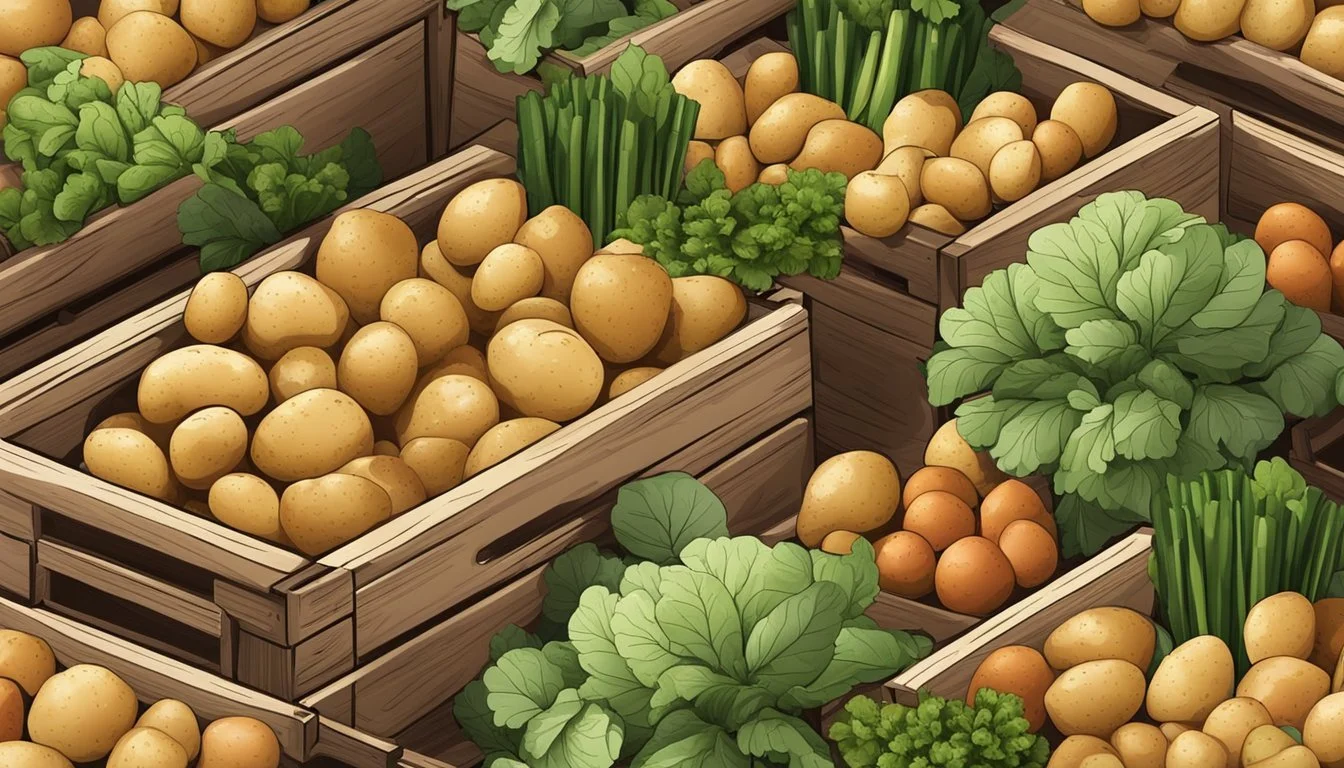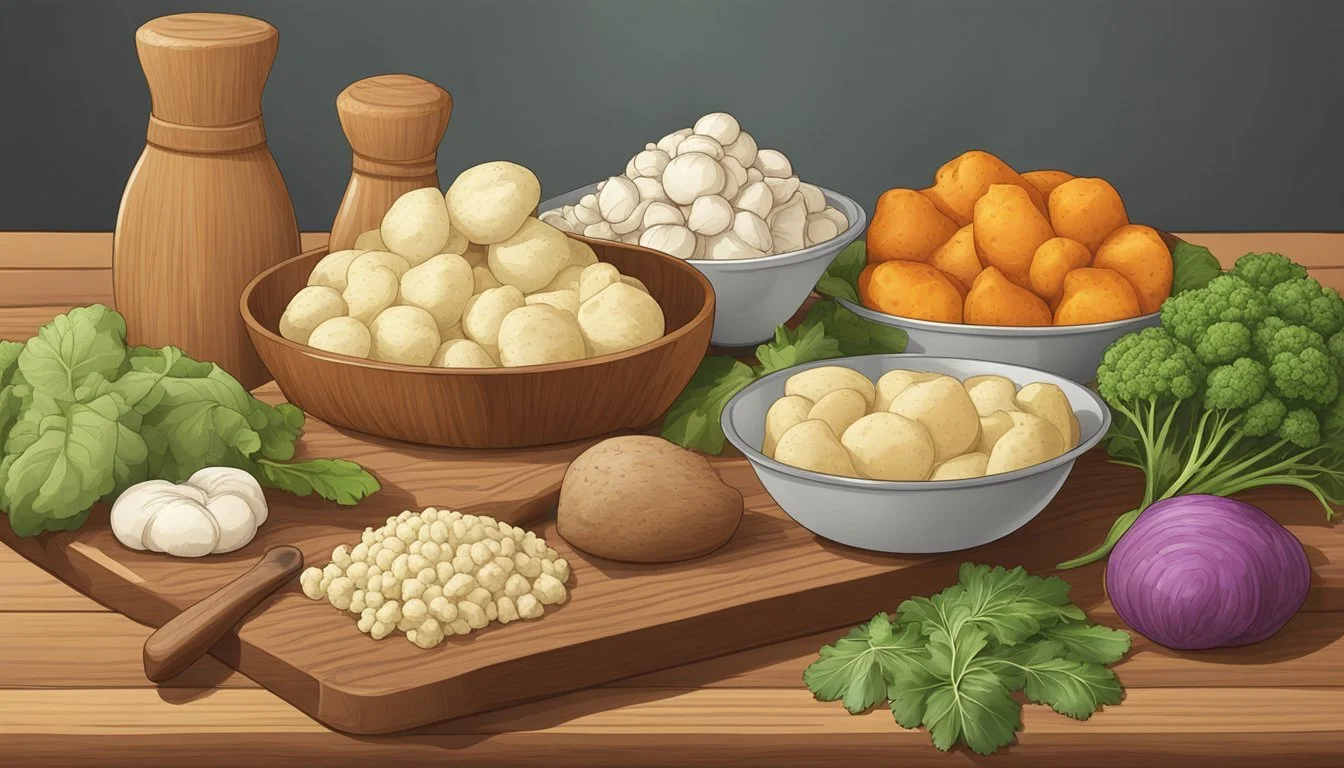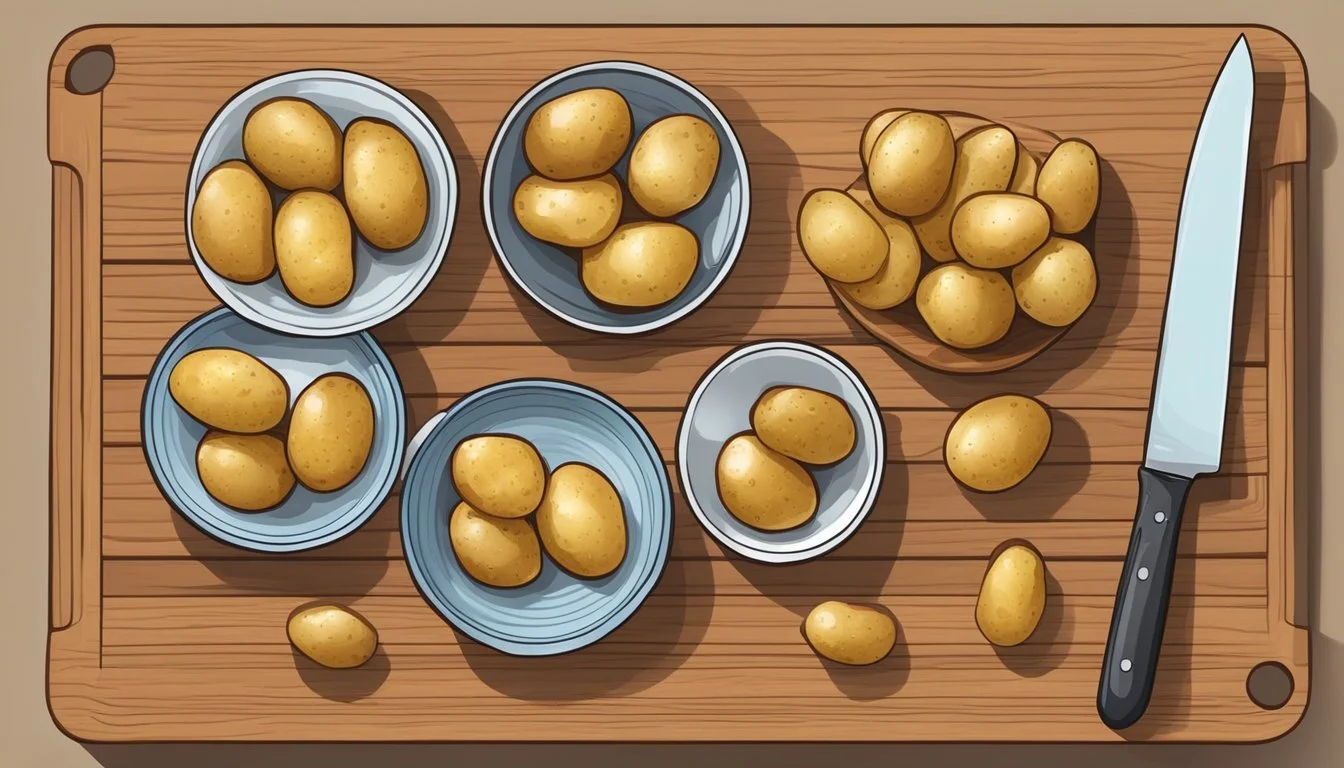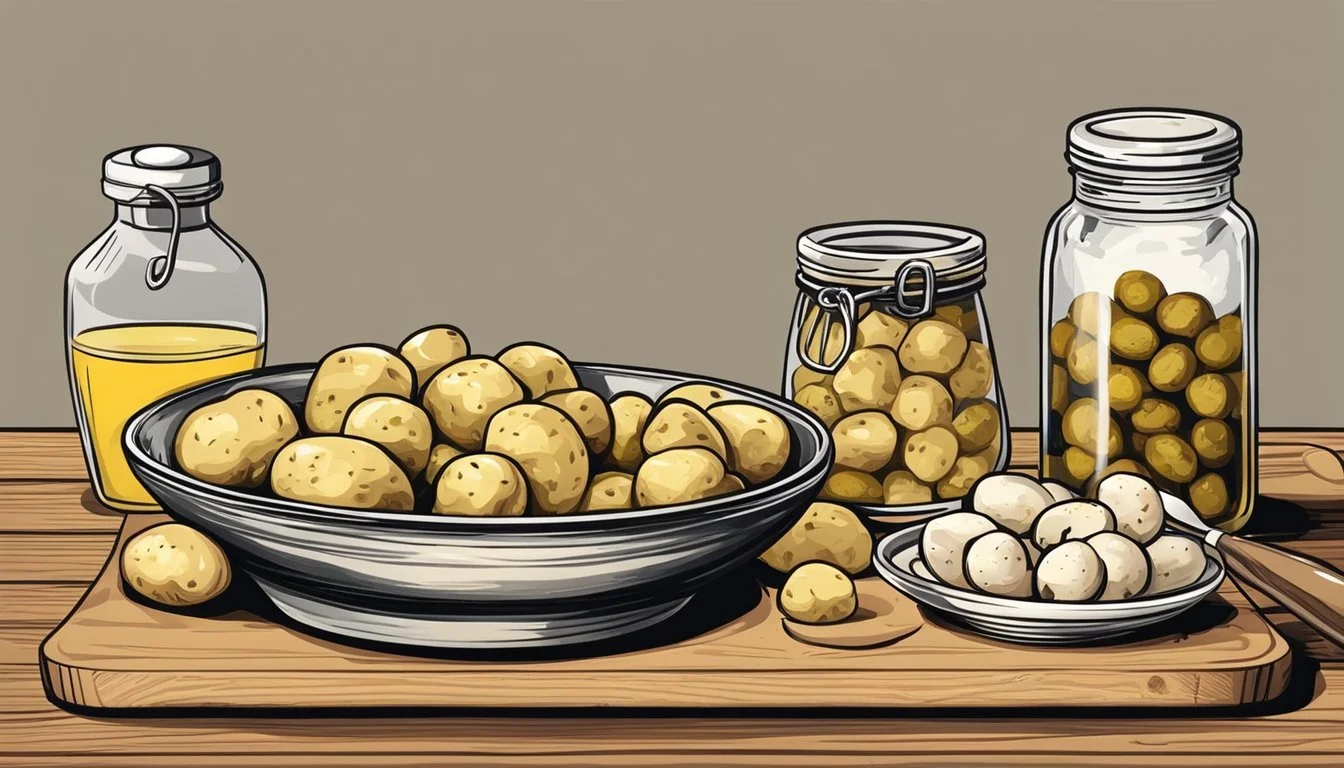Baby Potatoes Substitutes
Top Alternatives for Your Recipes
When it comes to replacing baby potatoes in your recipes, there are a variety of delicious and nutritious options available. Red radishes, known for their crunchy texture and low carb content, make an excellent substitute for baby gold potatoes. Their versatility allows them to be used in a range of dishes from salads to casseroles.
Zucchini and daikon also stand out as great alternatives. While zucchini shines in recipes like zucchini fries, daikon offers a similar starchy feel with far fewer carbs, making it perfect for low-carb diets. Experimenting with these vegetables can provide exciting new flavors and textures to your favorite dishes.
For those looking to maintain the texture and moisture similar to new or baby potatoes, turnips and carrots are worth considering. These root vegetables not only mimic the consistency of potatoes but also bring their unique flavors, making them suitable for a wide array of culinary applications.
Understanding Baby Potatoes
Baby potatoes, often referred to as new potatoes, are valued for their unique characteristics and nutritional benefits. They're versatile in the kitchen, making them a popular choice in various dishes.
Characteristics and Nutritional Profile
Baby potatoes are immature potatoes harvested early in the growing season. They have a small size, thin skins, and a waxy texture. Due to their high moisture content and low starch levels, they retain their shape well when cooked.
Nutritionally, baby potatoes are rich in vitamins like Vitamin C and minerals such as potassium and iron. They offer a decent amount of dietary fiber and have a moderate glycemic index, making them a good choice for maintaining stable blood sugar levels. Additionally, they contain complex carbohydrates which provide sustained energy.
Culinary Uses and Versatility
In the kitchen, baby potatoes are prized for their ability to fit into various culinary applications. They can be roasted, boiled, or steamed and offer a creamy texture with a subtly sweet flavor, making them perfect for salads and side dishes. Their firm texture when cooked ensures they hold up well in soups and stews.
To prepare baby potatoes, they can be halved or quartered and seasoned with olive oil, salt, and herbs. They do not require peeling due to their tender skins, saving preparation time. Their small size and consistent shape make them visually appealing for presentations, adding both color and taste to meals.
Common Potato Substitutes
When looking for alternatives to baby potatoes, a variety of options can provide similar textures and flavors. These substitutes can range from other root vegetables to low-carb alternatives and legumes or grains.
Root Vegetable Alternatives
Root vegetables such as sweet potatoes, parsnips, and turnips are excellent substitutes for baby potatoes. Sweet potatoes can be mashed, roasted, or fried, offering a slightly sweeter taste. Parsnips bring a nutty flavor and can be used in soups, stews, or roasted dishes.
Turnips offer a mild, slightly peppery flavor and can replace potatoes in many recipes such as casseroles and gratins. These root vegetables often provide a similar starchy texture and can be prepared in similar ways to potatoes.
Low-Carb Vegetable Options
For those on a low-carb diet, cauliflower, zucchini, and rutabaga are popular alternatives to potatoes. Cauliflower is highly versatile and can be mashed, roasted, or riced, making it a great low-carb potato substitute.
Zucchini can be spiralized, chopped, or baked, offering a lighter option that absorbs flavors well. Rutabaga is another low-carb option that can be mashed or roasted, providing a sweeter taste compared to traditional potatoes.
Legumes and Grains as Substitutes
Lentils and quinoa can also serve as substitutes for potatoes in certain dishes. Lentils, when cooked, provide a hearty texture similar to potatoes and can be used in soups, stews, and casseroles.
Quinoa offers a nutty flavor and can be used to create pilafs or as a base for grain salads in place of potatoes. Both lentils and quinoa are high in protein and fiber, making them nutritious alternatives.
Detailed Substitute Profiles
This section provides in-depth information on various substitutes for baby potatoes, highlighting their unique characteristics, nutritional aspects, and best uses in cooking.
Turnips and Rutabagas
Turnips are a nutrient-dense root vegetable, rich in vitamins C and K. They have a slightly peppery flavor and a firm texture that holds up well in stews and roasts. For a seamless substitution, use turnips in a 1:1 ratio with baby potatoes. Rutabagas, also known as swedes, offer a slightly sweeter taste compared to turnips, with a texture that mimics potatoes closely when cooked. These vegetables are excellent in mashes, roasted dishes, and soups. Both turnips and rutabagas are lower in carbohydrates, making them a suitable option for low-carb diets.
Radishes and Daikon
Red radishes provide a crunchy texture and a peppery bite, suitable for salads and roasting. When roasted, radishes mellow out significantly in flavor, becoming a delightful potato substitute. Daikon radish offers a milder taste and is very versatile. It works well in stir-fries, soups, and even as a crispy snack when sliced and roasted. Daikon’s low carbohydrate and calorie content make it an appealing choice for those monitoring their carb intake while still enjoying flavorful dishes.
Cauliflower and Celery Root
Cauliflower is a popular substitute for potatoes due to its versatility and low carb content. It can be mashed, roasted, or riced to replace potatoes in many recipes. It absorbs flavors well and has a mild taste that complements various seasonings. Celery root, or celeriac, provides a slightly nutty flavor and a texture similar to potatoes. When cooked, it can be mashed or puréed, giving a creamy consistency. Celery root is particularly useful in soups and stews, offering a distinct but harmonious flavor.
Squashes and Root Vegetables
Butternut squash is known for its sweet and nutty flavor. It can be roasted, mashed, or used in soups as a replacement for baby potatoes. This squash adds a beautiful orange color to dishes and pairs well with spices like nutmeg and cinnamon. Sweet potatoes are another great alternative, providing a sweet profile and a moist texture. Although higher in carbs, they offer ample nutrients, including vitamin A. Parsnips bring a mildly sweet and earthy flavor to dishes, working well in roasts and purees. These root vegetables can be used individually or combined for a diverse taste and texture experience.
These substitutes not only compensate well for baby potatoes in different dishes but also offer diverse nutritional benefits, catering to a variety of dietary needs and preferences.
Substitution Techniques
Substitutes for baby potatoes can be used effectively in a variety of cooking methods such as mashing and roasting. Each technique has its own set of best practices to ensure the final dish maintains its desired texture and flavor.
For Mashing and Purees
When creating mashed potatoes or purees, Yukon Gold potatoes are an excellent alternative to baby potatoes. They have a creamy texture and a buttery flavor that mimics the tenderness of mashed baby potatoes. Sweet potatoes can also be used if you prefer a slightly sweeter and more nutritious mash.
Ingredients to consider:
Yukon Gold potatoes: Creamy and smooth
Sweet potatoes: Slightly sweet and nutrient-rich
Cauliflower: Low-carb option with a mild taste
Methods:
Boiling: Boil the substitute potatoes until tender.
Steaming: Steam to retain more nutrients.
Mashing: Use a potato masher or a food processor to achieve a smooth consistency.
For Roasting and Baking
For roasting or baking, Red potatoes work well due to their waxy texture, which allows them to hold their shape. Daikon radish provides a low-carb alternative that becomes tender and slightly sweet when roasted. Kohlrabi is another substitute that roasts well and offers a unique flavor profile.
Ingredients to consider:
Red potatoes: Waxy texture, maintains shape
Daikon radish: Low-carb, becomes tender and slightly sweet
Kohlrabi: Unique flavor, firm texture
Methods:
Roasting: Toss with oil, salt, and pepper, then roast until golden brown.
Baking: Bake in a preheated oven until tender and caramelized.
Seasoning: Use herbs like rosemary or thyme to enhance the flavor.
Each substitute matches specific culinary needs, ensuring your dish remains flavorful and texturally appealing whether you're mashing or roasting.
Recipe Adaptation Tips
When adapting a recipe to use substitutes for baby potatoes, paying attention to flavors, textures, proportions, and cooking times ensures successful results. Proper adjustments can enhance the overall dish and prevent common pitfalls.
Adjusting Flavors and Textures
Flavors and textures are crucial when swapping ingredients. Baby potatoes are mild, with a fine, creamy texture. Fingerling potatoes, for instance, are a good replacement as they have a similar profile.
If using sweet potatoes, be mindful that they add sweetness. Compensate by adjusting seasonings. A bit of extra salt, pepper, and perhaps a dash of herbs like rosemary or thyme can balance the flavors. Similarly, using carrots requires reducing sweetness by incorporating zesty or savory spices.
The texture is also essential. Ensure that the substitute is either boiled or roasted to match the original recipe's consistency. This approach maintains the dish's integrity, avoiding mismatched experiences for those enjoying the meal.
Proportions and Cooking Times
The size and style of the potato substitutes influence both proportions and cooking times. For consistent results, measure substitutes equivalently. For instance, use one cup of halved fingerling potatoes if the original recipe calls for one cup of baby potatoes.
Cooking times vary based on density and moisture content. Sweet potatoes and carrots cook differently compared to baby potatoes. Sweet potatoes, being denser, may need longer cooking times. Start checking for doneness a bit earlier to avoid overcooking. Carrots, being less dense, often cook faster. Adjust timers and keep an eye on the oven.
Tip: Check doneness with a fork. If it slides in easily, the substitute is ready. This small step ensures perfectly cooked dishes with any potato alternatives.






